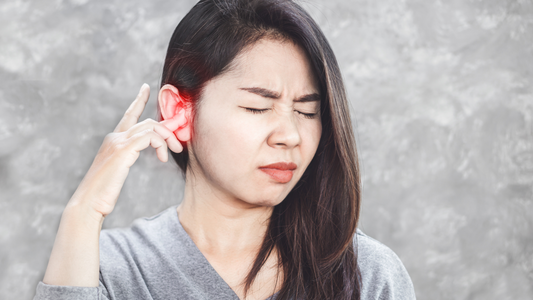Having trouble finding some peace and quiet because of a constant ringing in your ears? You're in good company. Many folks deal with this nagging issue known as tinnitus. It's like background noise that's always there, disturbing your calm and messing with your sleep. Wouldn't it be great to dial down that bothersome sound?
Many seniors are discovering ways to reclaim the silence and ease into relaxation. Curious if there's something that could shift your attention away from that irritating ringing to, perhaps, a sound that's a bit more soothing? Imagine if bedtime became a time to unwind, free from the ruckus in your ears. Let’s talk about what you can do to push back when tinnitus is cramping your style. Ready to learn more? Walk with me through some options for tinnitus relief and advice for better sleep.
Exploring Tinnitus Therapy Options
Dealing with a constant buzzing or ringing in the ears is a real bother, isn't it? Let's talk about someone who's been through the wringer trying to find some quiet. This person has had tinnitus for a good while and tried a bunch of things with no real change. Then comes a shift in tactics: cognitive-behavioral therapy (CBT). It's a type of treatment that doesn't silence the noise but teaches a new response to it. It's about understanding the noise is there but not letting it spoil the whole day. It's akin to adapting your steps to a tune that you didn't choose to play. Admittedly, it's a learning curve and it requires some grit, but for numerous folks, it's been a real game-changer in reclaiming some serenity.
tips for living with tinnitusEmbracing the Night with Soothing Sleep Sounds

Struggling with tinnitus when trying to catch some shut-eye in a nearly silent room? That constant ringing or buzzing often persists, stubbornly, exactly when you’re aiming for rest. So, what's the solution? We're talking about turning to sleep sounds. Picture being enveloped by the soothing susurrus of ocean waves, or a faint rustle of leaves — these are the sounds that can help mask that relentless internal noise. The right kind of ambient sound matters, ones that tone down the tinnitus and make nighttime restful again. No need for fancy equipment either; sometimes, an app or an old-school fan might just be enough. It's about setting up an auditive environment that helps ease your mind into tranquility.
Only Go to Bed When You Are Tired
Trying to hit the sack super early with the idea of snagging extra sleep? I get it, but lying there wide-eyed, your thoughts racing - it doesn't help, especially with tinnitus cranking up its volume. It's a bit like deciding you’re going to sleep without asking your body if it's tired yet.
Consider hitting the pillow only when you're truly ready to conk out. Might be later than your usual bedtime, but it’s your body's natural sleep signal. Look at kids, for example. They don’t stare at the clock, they just zonk out when exhaustion hits. That approach could help you slide into sleep faster, pushing those relentless ear buzzings to the back of your mind.
If sleep isn't beckoning, distract yourself with something calming – a chapter of your current book or fluffing the pillows. Forget matching your snooze schedule with nighttime TV. Tune into your body's cues instead. Then when you finally hit the hay, your tinnitus may just fade out as you slip into the land of nod.
Cultivating a Sanctuary for Slumber: Essentials of Good Sleep Hygiene
Making your bedroom a sleep-friendly space is important, especially for a solid night's rest. It's the little things, like a cooler, dark room, that signal to your brain it's time for sleep. That smartphone? Better outside the room or facedown to avoid any disruptions to your sleep.
I heard about someone who traded a lumpy mattress for a better one, and it worked wonders. It makes sense—more comfortable bedding can really improve sleep quality. He also cut out late-night exercises and switched to evening walks. Simple changes like these are sleep hygiene basics, and believe it or not, they do make a difference in managing tinnitus at night.
The sleep equation isn't complete without considering what you drink. Alcohol before bed—a no-go. Try a warm, milky drink or herbal tea instead. And caffeine? Keep that for the mornings. These habits help your body wind down for the restful night you deserve.
Conclusion
Tinnitus might be a tough nut to crack when you're trying to lay your head down for a good night's sleep. That being said, there are solid ways to get a handle on it so you can rest easy. CBT and white noise aren't just buzzwords – they're real tools that could dial down those ear buzzings and lead you to peaceful slumber.
Timing your bedtime to when you actually feel tired might seem like common sense, and it is. Same goes for turning your bedroom into a restful enclave with a few thoughtful changes. Comfortable sleep is within reach, and it starts with building a routine that sends tinnitus packing. Here's to mastering those quiet nights and recharging for what tomorrow brings!
Winding Down the Right Way
Tired of fighting that persistent ring in your ears when all you want is to nod off? You’re not alone, and the good news is, a few simple habits might make a world of difference. You now know to keep your bedroom dark and cool, and fill it with gentle sleep sounds that can help coax you into a calmer state, pushing tinnitus aside.
Listen to your body and hit the sack only when you're good and ready. It's one way to outsmart those high-pitched concertos in your ears. Instead of following a strict bedtime ritual, take a cue from the young ones—they've got the right idea. When you're truly sleepy, getting under the covers can transform your night into the restful escape you’re after. Let’s make sure we all get our well-deserved quiet time.
Sources & References
- Bauer, C. A., Berry, J. L., & Brozoski, T. J. (2017). The effect of tinnitus retraining therapy on chronic tinnitus: A controlled trial. Laryngoscope Investigative Otolaryngology, 2(4), 166-177. https://www.ncbi.nlm.nih.gov/pmc/articles/PMC5527070/
- Hoare, D. J., Searchfield, G. D., El Refaie, A., & Henry, J. A. (2014). Sound therapy for tinnitus management: practicable options. Journal of the American Academy of Audiology, 25(1), 62-75. https://www.thieme-connect.com/products/ejournals/abstract/10.3766/jaaa.25.1.5
- Jastreboff, P. J., & Jastreboff, M. M. (2000). Tinnitus retraining therapy (TRT) as a method for treatment of tinnitus and hyperacusis patients. Journal of the American Academy of Audiology, 11(3), 162-177. https://pubmed.ncbi.nlm.nih.gov/10755812/
- Martinez‐Devesa, P., Perera, R., Theodoulou, M., & Waddell, A. (2010). Cognitive behavioural therapy for tinnitus. Cochrane Database of Systematic Reviews, (9). https://www.cochranelibrary.com/cdsr/doi/10.1002/14651858.CD005233.pub3/full
- Okamoto, H., Stracke, H., Stoll, W., & Pantev, C. (2010). Listening to tailor-made notched music reduces tinnitus loudness and tinnitus-related auditory cortex activity. Proceedings of the National Academy of Sciences, 107(3), 1207-1210. https://www.pnas.org/doi/10.1073/pnas.0911268107

The Hear Well Group Research Team: Trusted Hearing Health Insights
Our experienced research team compiles hearing health data from credible, peer-reviewed sources and presents it in easy-to-understand terminology. We ensure accuracy and trustworthiness, providing up-to-date, evidence-based recommendations to enhance hearing care practices and inform our readers' hearing well-being decisions.


